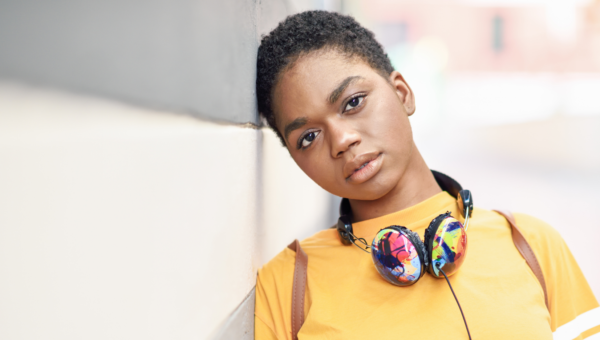When your child comes out as gay, bisexual or transgender, it can be a life-changing experience for both of you. “Coming out” may be the first time your child feels comfortable sharing their true identity. But as a parent, this revelation may be surprising, confusing or upsetting. Even parents who are allies of the LGBTQ community may struggle at first to express their feelings in a helpful way, or feel a sense of loss for the future they have imagined for their child.
As you begin on this new chapter of your parenting journey, it is important to remember the difficult emotions you may be feeling are likely ones your child has been experiencing much more intensely and for a longer period of time: from guilt, denial and fear of rejection, to depression and uncertainty.
Coming out is a turning point where you can help your child feel unconditional love, acceptance, pride, and hope for the future. Find tips for parents to show support for your queer child or teenager below.
Exploring Sexuality and Gender Identity as a Young Adult
It may be helpful to learn common terms in the queer community in order to clearly and respectfully communicate with your child. LGBTQIA+ is an acronym for:
- Lesbian;
- Gay;
- Bisexual;
- Transgender;
- Queer or Questioning;
- Intersex;
- Asexual or Ally; and,
- A spectrum of other identities and orientations (+).
In the medical and scientific communities, it is widely accepted that a person does not choose to be gay. A person’s sexual orientation and gender identity is natural instinct, and not a result of parenting or other outside influences.
Research has shown that children begin to develop a sense of their gender identity as early as pre-school or kindergarten, around the age of 5. At this stage, they may start to realize they are “different.” For this reason and others, it is very important to listen without judgment or reservation when your child comes out, or expresses that they are questioning their sexuality. This is not just a phase, but likely something they have been struggling to understand from a very young age.
How Family Support Can Help LGBTQIA+ Kids and Teens
We live in a world where male-female relationships are considered the norm and our appearance is often affected by sex and gender stereotypes. There is a long history of violence and hateful treatment of LGBT individuals, and in many communities and religious groups to this day, people who are openly queer are unwelcome.
School-age children who identify as queer are at-risk for bullying and online harassment, known as cyberbullying. Being a teenager in today’s world is hard enough, and teens who are struggling to understand and accept their LGBTQIA+ identity without support from loved ones face a unique set of challenges.
According to a survey from The Trevor Project:
- Nearly half of LGBTQ youth (48%) reported engaging in self-harm in the past year.
- 40% of LGBTQ youth seriously considered attempting suicide in the past year.
- 1 in 3 LGBTQ youth reported being physically threatened or harmed at some point because of their LGBTQ identity.
There are significant mental health concerns for teens in the LGBTQ community, but receiving support and unconditional love from a family member can be a major force of positive change. In fact, family acceptance has been shown to protect against suicide, depression, and substance use, while promoting overall health and self-esteem.
In other words: Offering unconditional love and support can be one of the most powerful ways to help your child become a healthy adult.
Tips to Show Support for an LGBTQ Loved One:
- Provide unconditional love.
“I love you” is a powerful phrase. When you do not know what to say, or feel overwhelmed with different, competing emotions about your child’s sexuality, do not underestimate the importance of reminding them they are loved. While you cannot always undo the damage of a thoughtless comment or unkind remark, you will never regret telling your child how much you love them. - Create a safe space.
Your home should be a place where everyone in your family feels safe and respected. You can help create a safe space for your LGBTQ family member by:- Using their identified pronouns
- Engaging in books, movies, and TV shows which celebrate diversity and inclusion
- Eliminating the use of slurs and harmful language
- Calling out bias, discrimination, and hate speech, and refusing to allow this behavior from guests or other family members
- Be an advocate.
As a parent, it is your job to advocate for your child’s needs and look for warning signs of a mental health concern. If you suspect they are being bullied at school, meet with their teachers and develop a plan for their safety. Be persistent with teachers and school administrators if the bullying continues. - Educate yourself.
Commit to learning more about the LGBTQIA+ community — regardless of whether or not you currently support these lifestyles. We often feel skeptical or afraid of things we do not understand, and learning more about your child’s experiences may help offer you a new perspective.If your religious beliefs are preventing you from supporting the queer community, remember that you can offer love and support even when you do not agree with all aspects of another person’s life. - Find support.
Parenting is not easy, and parents with an LGBTQ child or teenager can benefit from seeking a mental health resource to help them through life’s challenges and uncertainties. Support groups can be extremely helpful, as well as attending family sessions with your loved one.
Places for People is a Safe Space for St. Louis Mental Health Care
If you or your child are looking for LGBTQIA+ affirming counseling, Places for People in St. Louis is a safe space. Our culturally competent staff are trained to provide adults and youth with therapy services they need to navigate the process of sharing their queer identity and maintaining healthy relationships with supportive loved ones. Places for People also offers services through the Ryan White HIV/AIDS program.
Read more about outpatient therapy services for youth and families in St. Louis. To schedule a session, call (314) 615-9105 Ext. 292 to speak confidentially with a member of our Youth and Family Services treatment team.
If you or a loved one are in crisis and need after-hours support, please call 1 (800) 811-4760 for a 24-hour Crisis Support Hotline.
This article is provided for general informational purposes only and should not be considered a substitute for medical advice, diagnosis or treatment from a licensed health care professional. Always seek the advice of a licensed professional for any questions or concerns regarding your physical or mental health, or the health of a loved one.




